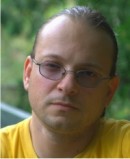|
||||||||||||||
|
Plenary
Lecture
Abstract: Formal methods--be they logical (such as
model checking) or algebraic (such as model-based
testing)--have established themselves as mainstream
tools for verification and validation. Hardware, device
drivers, and network protocol have all been formally
validated in various contexts. Recent Turing prizes have
recognized this success. When it comes to specifying and
verifying complex application software, formal methods
have hit however a stumbling block. Indeed, conformance
testing is traditionally based on finite-state
formalisms: a system is at any time in one of the
multitude of named states. Such an approach fails for
complex software because of the sheer number of
necessarily distinct states (already happening in
simpler systems, but becoming simply unmanageable for
complex applications such as word processors or
operating systems). Bringing conformance testing to
complex application software is an emerging area.
Typical programming languages (and thus the control flow
of software programmed using them) feature nested,
recursive invocations of program modules. These features
are modelled naturally by context-free languages. Many
non-regular properties are therefore required for
software verification. Such properties generate an
finite state space, which cannot be handled by
finite-state process algebrae or by standard
verification techniques such as model checking.
Context-free process algebrae such as BPA can specify
context-free properties. However, concurrency cannot be
provided by context-free process algebrae since
context-free languages are not closed under
intersection. This talk focuses on the quest of finding
a formalism that is expressive enough to model the
context-free phenomenae from complex software yet allows
for a compositional approach to conformance testing. We
start with visibly pushdown languages (VPL), a promising
construct which unfortunately is not suitable for
compositional specification and verification. We extend
VPL to multiple stacks, obtaining multi-stack visibly
pushdown languages (MVPL). These languages model
concurrency naturally, but their standard definition
does not allow compositional approaches. We then present
an alternate set of operations over MVPL that are
natural and also permit compositional specification and
verification. The subsequent tools for specifying and
verifying complex, recursive application software will
also be discussed, mostly in the context of functional
programming languages (such as Haskell or Erlang).
|
|
|||||||||||||
|
|
|
|
||||||||||||
| copyright - designed by WSEAS | ||||||||||||||
